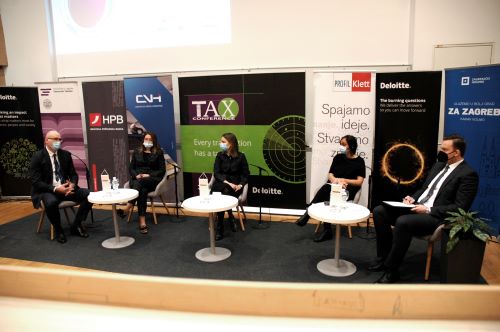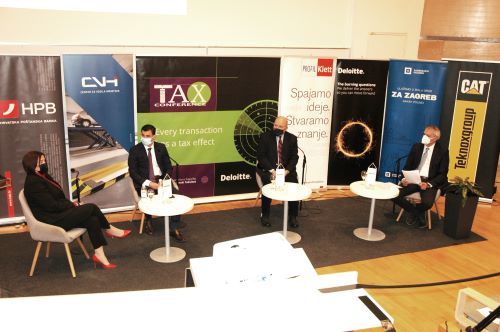On January 29, 2021, the Fourth Tax Conference: Tax Policy in the Post-Pandemic Period was held in the Congress Hall of the Faculty of Economics & Business, University of Zagreb, in strict compliance with epidemiological measures and recommendations.
The conference, which was held under the auspices of the Ministry of Finance of the Republic of Croatia, was jointly organized by the Faculty of Economics & Business - Zagreb and the Deloitte Company. The conference was held in a hybrid format with a limited number of participants (speakers) in the audience, while the general public had the opportunity to follow it through the YouTube channel of the Faculty of Economics & Business - Zagreb.
The conference aimed to encourage the exchange of ideas and opinions and provide practical recommendations for improving the tax system of the Republic of Croatia through dialogue between the main participants and representatives of taxpayers and the state.
On behalf of the organizers, the participants were greeted by Prof. Jurica Pavičić, Ph.D., Dean of the Faculty of Economics & Business - Zagreb, Mr. Dražen Nimčević, partner at Deloitte Croatia and Assist. Prof. Marko Primorac, Ph.D., Faculty of Economics & Business - Zagreb.
In addition to the lecture on Tax Policy Challenges in Croatia given by Mr. Zdravko Marić, Ph.D., the Deputy Prime Minister of the Republic of Croatia, and the Minister of Finance, two-panel discussions were held on current tax topics:
Panel 1. New generation tax policy
Panel 2. Digitization and fulfillment of tax obligations
Mr. Božidar Kutleša, Director of the Tax Administration, Ms. Helena Schmidt, Partner in Deloitte's Tax Consulting Department, Ms. Marijana Starčević, Tax Manager at Orbico and Ms. Ana Stojić Deban, President of the Management Board of Zagreb Holding, took part at the panel discussion "New Generation Tax Policy". The panel was moderated by Assist. Prof. Marko Primorac, Ph.D., from the Faculty of Economics & Business.
The second part of the conference followed by a panel discussion moderated by Mr. Dražen Nimčević, Head of Tax and Legal Consulting in charge of Deloitte's South Central Europe Region, was attended by Ms. Nikolina Cvijetić, Team Manager at Expert Consulting, Mr. Marko Ignjatović, Ph.D., Director of Libusoft Cicom and Mr. Boran Lončarić, founder and owner of GDi Group
.
The messages released by the conference were related to the need for further adaptation of the tax system to modern economic conditions, and special emphasis was placed on measures adopted by the Government of the Republic of Croatia within the tax system in response to the crisis caused by the pandemic, but also on the earthquake that hit Croatia several times. Besides, in the context of further tax relief, it was pointed out that the share of taxes and surtaxes on income tax in the total workload (tax wedge) in Croatia is among the lowest in Europe. Therefore, but also since an additional reduction in income tax would seriously jeopardize the system of financing local and regional self-government units, it was proposed that further relief within the income from self-employment (wages) be directed to reducing contributions. In this way, the relief would be felt by the citizens with the lowest incomes who, due to the high basic personal deduction, are no longer obliged to pay income tax.
In the context of consumption taxes, the emphasis was on excise duties. It is clarified that the primary goal of excise duties is to correct negative externalities or, simpler, the harmful effects that the consumption or production of products has on society. Therefore, the amount of excise duty should be adjusted so that the total revenue from excise duty is equal to the cost of social damage associated with the consumption or production of a particular product. It was emphasized that tax policy, especially in this case, must be in the function of other policies - health policy, environmental policy, and even investment in research and development. Tax policy can stimulate research and development in industries that produce harmful products or products whose production indirectly results in harmful effects. An appropriately regulated tax system can encourage producers to make certain business changes to reduce environmental pollution or to improve product characteristics to reduce harmful effects on health. Ultimately, the excise system must stimulate - or rather - reward the production and consumption of products that are innovative and less harmful.
A separate discussion was held on the issue of the need for further digital and analytical transformation of the Tax Administration, planned activities of the Tax Administration and other relevant bodies in terms of preventing tax evasion and increasing the efficiency of tax collection, but also strengthening internal processes and transparency of the state in taxation and spending.


.
The messages released by the conference were related to the need for further adaptation of the tax system to modern economic conditions, and special emphasis was placed on measures adopted by the Government of the Republic of Croatia within the tax system in response to the crisis caused by the pandemic, but also on the earthquake that hit Croatia several times. Besides, in the context of further tax relief, it was pointed out that the share of taxes and surtaxes on income tax in the total workload (tax wedge) in Croatia is among the lowest in Europe. Therefore, but also since an additional reduction in income tax would seriously jeopardize the system of financing local and regional self-government units, it was proposed that further relief within the income from self-employment (wages) be directed to reducing contributions. In this way, the relief would be felt by the citizens with the lowest incomes who, due to the high basic personal deduction, are no longer obliged to pay income tax.
In the context of consumption taxes, the emphasis was on excise duties. It is clarified that the primary goal of excise duties is to correct negative externalities or, simpler, the harmful effects that the consumption or production of products has on society. Therefore, the amount of excise duty should be adjusted so that the total revenue from excise duty is equal to the cost of social damage associated with the consumption or production of a particular product. It was emphasized that tax policy, especially in this case, must be in the function of other policies - health policy, environmental policy, and even investment in research and development. Tax policy can stimulate research and development in industries that produce harmful products or products whose production indirectly results in harmful effects. An appropriately regulated tax system can encourage producers to make certain business changes to reduce environmental pollution or to improve product characteristics to reduce harmful effects on health. Ultimately, the excise system must stimulate - or rather - reward the production and consumption of products that are innovative and less harmful.
A separate discussion was held on the issue of the need for further digital and analytical transformation of the Tax Administration, planned activities of the Tax Administration and other relevant bodies in terms of preventing tax evasion and increasing the efficiency of tax collection, but also strengthening internal processes and transparency of the state in taxation and spending.